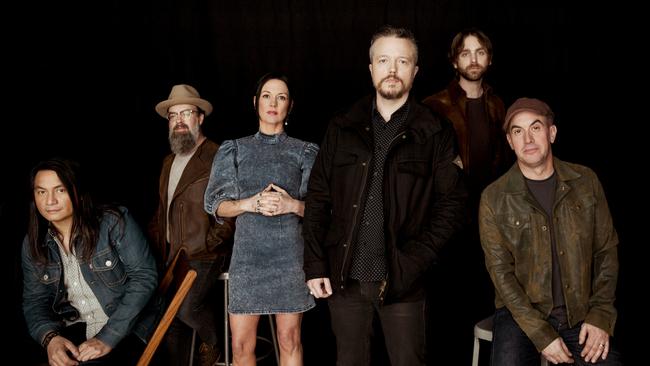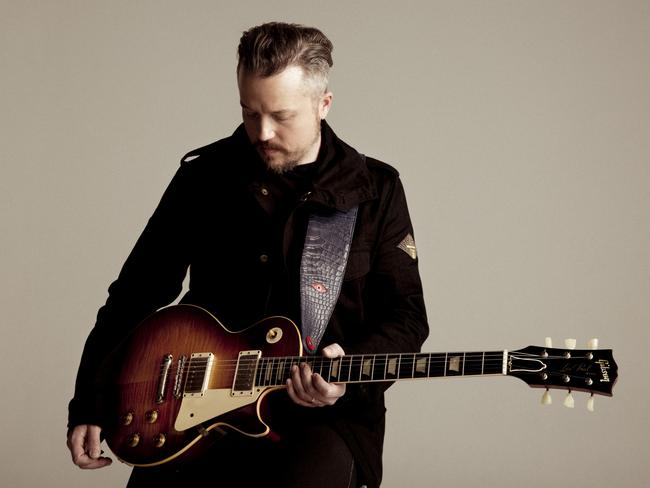Letting It Go: Jason Isbell on fatherhood, sobriety and creativity
On his seventh solo album, Reunions, US singer-songwriter Jason Isbell reckons with ghosts of his past while savouring the present.

A couple of years ago Jason Isbell was on tour and had a day between shows, so he decided to go for a walk with his two-year-old. To his legion of fans in the Americana genre, which blends elements of folk, country and rock ’n’ roll, Isbell is viewed as one of the finest singer-songwriters of his generation. But on his day off he was just another dad pushing a stroller around a mall in Anytown, USA, showing the world to his child, scene by scene.
On this particular day, it occurred to him that he was with a person who had never heard of a milkshake, let alone tasted one. There was only one cure for this condition, and he relished the sight of watching Mercy Rose suck on the straw and have her tiny little mind blown by this new sensation.

From his country home outside Nashville this month, Isbell just about vibrates with glee while telling this story to Review after being asked whether he suspected he’d end up writing songs about fatherhood once he learned he was going to be a parent with his wife, songwriter and musician Amanda Shires.
“Oh yeah, I always write songs about whatever’s going on in my life,” he says. “That’s the most amazing thing because now I find myself thinking about how good a milkshake really is. Before that day, I had sort of filed it away: ‘Yeah, milkshakes are great, whatever; I’ve got shit to do, I’m a big, important man!’ But after that day, I was like, you know, most of the things that you do in the world — no matter how important you think they are — most of them suck compared to a milkshake.”
That moment in the mall with his daughter reminded Isbell that one of a parent’s roles in early childhood is to be a kind of tour guide, as the child begins to explore their surroundings and come into contact with remarkable and surprising things that are very easy for adults to overlook.
“It’s like being with somebody who’s had a sack of mushrooms or some acid, because their eyes are wide open and everything is amazing,” he says. “I mean, some people’s parents are dickheads, so sometimes they’re like: ‘Yeah, big deal — I’ve seen that before.’ But if you’re not an asshole, you’re stopping to go, ‘You know what? That is pretty cool. That aeroplane is like a house in the sky!’ ”

Coming from the mouth of most other popular musicians, this casual reference to the effects of hallucinogenic drugs might scarcely raise an eyebrow. Yet for Isbell, such talk is firmly in the rear-view mirror. At the age of 41, he has been sober and drug-free for eight years — a proud fact that has been well-documented in his lyrics, which tend to burn with searing honesty when writing about himself, and sparkle with a novelist’s eye for characters, description and dialogue when writing through the eyes of others.
“As a songwriter, there’s no better tool to have than awareness,” he says, thinking back to that milkshake revelation. “That’s the No 1 thing: you don’t have to rhyme, you don’t have to write choruses, you don’t have to do any of that shit. All you really have to do is pay very close attention, as much as you possibly can. Because there’s all these different types of songwriters that I love, and they all have the one thing in common: they’ve all found some perspective that I hadn’t considered before, or some angle, or some light to put the subject in that I have not seen the subject in before.
“So anything that changes your perspective is just a wonderful thing for a songwriter; a really fortunate thing to have happen.”
On his upcoming seventh album, Reunions, Isbell’s writing reckons with ghosts of his past on songs such as Only Children and encourages people to speak up on behalf of those with less power than themselves on Be Afraid. Like most of his recent releases, it was recorded with his band the 400 Unit, in which Shires occasionally plays when not performing in other outfits.
Its final song, Letting You Go, is aimed directly at his daughter, Mercy Rose: “Being your daddy comes natural / Roses just know how to grow,” he sings in its chorus. “It’s easy to see that you’ll get where you’re going / The hard part is letting you go.”
It’s a straightforward, three-minute track that can be described as the latest entry in a growing canon of classic Isbell tear-jerkers that includes Elephant — written about a couple of characters dealing with a terminal diagnosis by attempting to drink their pain away — and Cover Me Up, a stirring and plain-spoken song of his love for Shires that includes this all-time great line: “Home was a dream / One I’d never seen / ’Til you came along.”
Isbell wrote Letting You Go in about five hours while sitting at a small table in his bedroom — a space he likes because it reminds him of the hotel rooms where he has spent most of his time sketching out song ideas since he joined southern rock band Drive-By Truckers as a guitarist in 2001, at the age of 22, and later became one of its chief singer-songwriters before being ejected from the band in 2007 because of his drinking.
“I wanted to write something that was for my daughter and about my daughter, and about being a parent — but it’s really easy to go too far with that and make it maudlin,” he says. “One thing that I have really prided myself on over the years is being able to write songs that, from the subject matter, seem like they would be terrible songs. Like Elephant: I wrote a song about two friends, and one of them’s dying of cancer. This sounds like it would be a song you would not want to listen to under any circumstances. But I like the challenge of taking those really heavy, really serious emotions and trying to use the right details and make those songs something that’s not maudlin, or not over the edge and cloying and pandering.”
After finishing the song, he showed it to Shires and, despite the intimate subject matter, he didn’t find it hard to play it for her at home. Letting You Go didn’t become heavy for the songwriter until he got into the studio a few weeks later and was surprised to find that it took three or four attempts to sing the words without breaking down, particularly towards the end, where he projects himself into the future and imagines walking Mercy Rose down the aisle.
It was only when his long-time producer Dave Cobb — who Isbell suspects doesn’t usually pay much attention to the lyrics, and instead concentrates on finding the right arrangement — had to call the recording session to an unexpectedly early close, saying that he had to go home and see his own daughter, that Isbell knew he had come up with something that would touch others, and that might even become one of his most-requested works.
“They’re all pretty serious to me,” he says in response to where Letting You Go may sit among all the songs he has written so far. “But that would probably rank in the top 10 songs that I felt like meant the most to me, on an emotional level.” After a brief pause, he says. “Maybe in the top five. Maybe in the top three.”
READ MORE: Adam Briggs on taking the shot to pay tribute to Archie Roach | Review’s Isolation Room: Colin Hay
As for when he realised that awareness was the sharpest tool in his songwriting kit, the Alabama-born musician credits his decision to quit drinking in February 2012. After rehab, he found that, rather than feeling awful physically and psychologically for most of the day, he could now sit in a chair and write for six or seven hours at a stretch. As well, he realised a newness of perspective coupled with the unrefined ability to pay attention to everything that was happening around him, rather than being driven by the selfish need to quench his thirst.
“It was the same world, but it was much clearer, and that was just huge for me as a songwriter,” he recalls. “Huge, because I had more details to choose from, and then I had more time to choose the right ones. And that’s really what you need, I think, to write songs.”
That was the period in his life when he began writing his breakthrough fourth album, Southeastern, released in 2013, followed by two more albums in 2015 and 2017 that won him four Grammy Awards and each sold more than 140,000 copies in the US — healthy numbers that make him one of the leading lights of Americana.
In the past decade of popular music, there are few better transformation stories than Isbell’s, because his before and after are so stark. Before, he was a gifted musician with an out-of-control dependence that acted as a handbrake on his success; now he is in control of his addiction and has spent the past eight years excelling creatively in parallel with starting a family and doing his best to remember just how great milkshakes really are.
“It’s not that everything got better — it’s just that I had what I needed to try to make everything better,” he says of that transition. “I was able to start the work of becoming a better songwriter, a better musician and a better person. Before that, I’d just been sort of postponing all that for as long as possible.”
Reunions is released on Friday May 15 via Spunk Records.


To join the conversation, please log in. Don't have an account? Register
Join the conversation, you are commenting as Logout